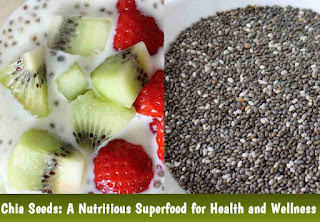Chia Seeds: A Nutritious Superfood for Health and Wellness
Chia seeds have been used as a food source for centuries and are considered a superfood due to their high nutrient content. They are derived from the Salvia hispanica plant, which is native to Mexico and Guatemala. Chia seeds are an excellent source of fiber, protein, and omega-3 fatty acids, making them a great addition to a healthy diet.
In this article, we will explore the health benefits of chia seeds, their nutritional value, and how to incorporate them into your diet.
Nutritional Value of Chia Seeds
Chia seeds are a rich source of several important nutrients, including:
Fiber: Chia seeds are an excellent source of fiber. Just one ounce of chia seeds contains 11 grams of fiber, which is about one-third of the recommended daily intake for adults.
Protein: Chia seeds are also a good source of protein, containing around 4 grams per ounce.
Omega-3 Fatty Acids: Chia seeds are one of the best plant-based sources of omega-3 fatty acids, with one ounce containing around 5 grams.
Calcium: Chia seeds are a great source of calcium, with one ounce containing around 18% of the recommended daily intake.
Phosphorus: Chia seeds are also a good source of phosphorus, with one ounce containing around 27% of the recommended daily intake.
Other Nutrients: Chia seeds also contain several other important nutrients, including magnesium, potassium, and zinc.
Health Benefits of Chia Seeds
Chia seeds have been linked to several health benefits, including:
1. Weight Loss: Chia seeds are high in fiber, which can help you feel full and reduce your calorie intake. They are also low in calories, making them a great addition to a weight loss diet.
2. Heart Health: The omega-3 fatty acids in chia seeds have been linked to improved heart health. They can help lower cholesterol and triglyceride levels, which are risk factors for heart disease.
3. Bone Health: Chia seeds are a good source of calcium, which is essential for healthy bones. They also contain phosphorus, which works with calcium to maintain strong bones.
4. Blood Sugar Control: Chia seeds are high in fiber, which can help slow down the absorption of sugar into the bloodstream. This can help keep blood sugar levels stable and reduce the risk of type 2 diabetes.
5. Digestive Health: The fiber in chia seeds can also help promote digestive health by feeding the friendly bacteria in the gut.
6. Anti-Inflammatory: The omega-3 fatty acids in chia seeds have anti-inflammatory properties, which can help reduce inflammation in the body and protect against chronic diseases.
How to Incorporate Chia Seeds into Your Diet
Chia seeds are incredibly versatile and can be added to a wide range of dishes. Here are a few ways to incorporate them into your diet:
1. Smoothies: Add a tablespoon of chia seeds to your favorite smoothie recipe for an extra boost of fiber and protein.
2. Oatmeal: Stir in a tablespoon of chia seeds into your morning oatmeal for added texture and nutrition.
3. Yogurt: Mix in chia seeds to your yogurt or Greek yogurt for a crunchy and nutritious snack.
4. Salad Dressing: Mix chia seeds into your favorite salad dressing for added texture and nutrition.
5. Baked Goods: Chia seeds can be added to baked goods like muffins, bread, and cookies for an extra boost of nutrition.
6. Chia Pudding: Mix chia seeds with milk or a non-dairy alternative to create a tasty and nutritious chia pudding.
7. Sprinkled on Top: Sprinkle chia seeds on top of your breakfast, lunch, or dinner dishes for added nutrition and crunch.
When using chia seeds in your recipes, it's important to keep in mind that they absorb liquid and can become gel-like in texture. This can be useful when making chia pudding or as a substitute for eggs in vegan baking recipes, but it's important to adjust your recipes accordingly.
In terms of storage, chia seeds can be kept in an airtight container in a cool, dry place for up to two years. They can also be stored in the fridge or freezer for longer shelf life.
Side Effects of Chia Seeds
While chia seeds are generally considered safe to eat, there are a few things to keep in mind. It's important to drink plenty of water when consuming chia seeds, as they can absorb liquid and expand in the stomach. This can lead to digestive issues like bloating and constipation if you're not drinking enough water.
Additionally, some people may be allergic to chia seeds, so it's important to start with a small amount and monitor your body's reaction.
Lastly, chia seeds may interact with certain medications, such as blood thinners, so it's important to talk to your doctor if you're on any medication and considering adding chia seeds to your diet.
Chia seeds are a highly nutritious superfood that can be easily incorporated into your diet. They are a great source of fiber, protein, and omega-3 fatty acids, and have been linked to several health benefits, including weight loss, heart health, and bone health. With their versatility and easy storage, chia seeds can be a convenient addition to any healthy eating plan. Just remember to drink plenty of water and start with small amounts to avoid any potential side effects.
